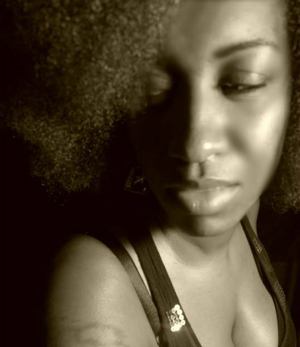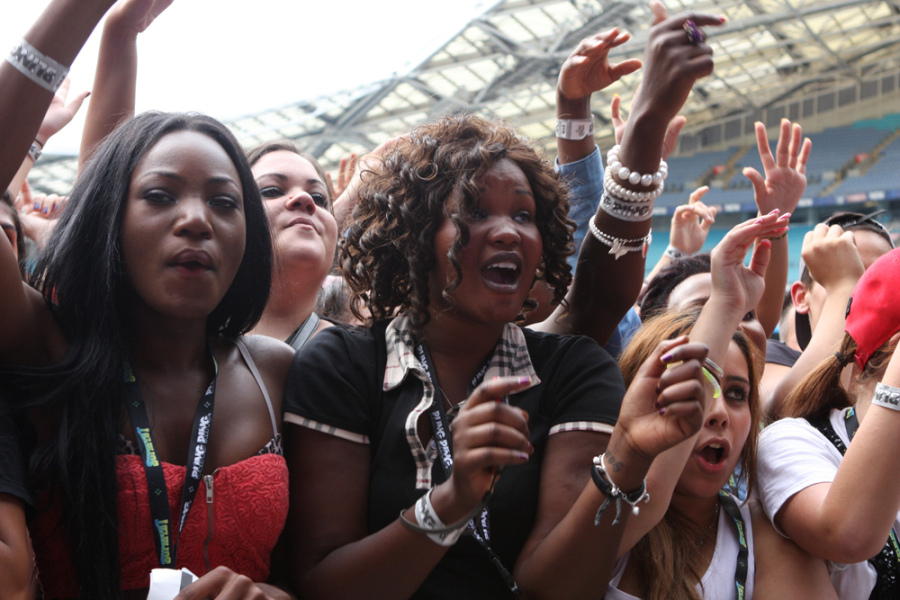Ask some music fans about D.C. concert audiences, and they’ll say our crowds suffer from paralysis of the feet. But as I reported recently in my story about Washington audience behavior, that stereotype disintegrates as soon as go-go enters the picture.
Take it from Michelle Blackwell and Gerald Lattimore, two accomplished go-go artists who told me they rarely — if ever — play to stone-faced audiences here.
“Being in the crowd is a really unique experience when it comes to go-go,” Blackwell told me. “D.C. go-go crowds are, like, the opposite of subdued.”
That’s just one of many insights Blackwell dispensed during our conversation at her home in Maryland. The vocalist and band manager talked about the one thing go-go audiences never do — take a guess! — and how she took a stand against violence at her concerts, even when it ruffled feathers.
When Lattimore arrived at the house mid-conversation, we dug even deeper: A keyboardist in one of the most influential go-go groups ever, Junkyard Band, he dished on the unspoken rules and trade secrets of playing go-go music in and around D.C.
Here are snippets from our conversation.
This interview has been edited for clarity and brevity.
On the one thing go-go audiences never do:
Michelle Blackwell: The only thing that D.C. go-go audiences don’t do is clap. It’s probably just because the songs never end, so they’re not accustomed to the song stopping and then you clap. The music never ends [at a go-go show]. It starts, and 45 minutes later, then it ends. But between songs, the beat’s riding, and it transitions into the next song. So there’s no applause.
On discouraging violence at go-go shows:
MB: Whenever we went into a new venue, I always had a meeting with the security team to make sure that they understood that there were certain procedures we wanted them to follow. First, being, we didn’t allow any men [up front]. That front line has to be women. Because guys tend to be more rowdy sometimes, especially if they’ve been drinking.

Michelle Blackwell
And this was one of the things that I probably wasn’t the most popular for, but if there was a certain group of people that were always starting things — because we were so close with our crowd, we kind of knew who everybody was — we would ban them. They would be pissed off in the beginning, but they would come back and act like they had some sense.
So they kind of knew when they were coming to see [my group] WHAT? Band that that’s not something that we condone. You wanna puff your chest out, this was not the place for it. And I didn’t allow our band members to talk about guns and violence on the stage.
On Junkyard Band’s anti-fighting policy:
Gerald Lattimore: One of our philosophies is one fight, good night. We have done that — we have literally stopped a show and that was it. People were mad.
But you can almost point to somebody and tell [who’s going to be a problem at a show]. Once we click the sticks, you can almost tell which section of the crowd that’s giving off the most energy. If you see a crowd bouncing around and they real hard and aggressive, why not place the security right there to calm it down?
“You’ve got the national acts now incorporating [go-go] music in their sets. You got Erykah Badu onstage singing ‘Sardines.'” —Gerald Lattimore of Junkyard Band
On how out-of-town audiences have responded to go-go:
GL: Out of town, they treat you like celebrities. They want autographs, take pictures. And you can tell they don’t get the music that often. I’ll give you an example. We played in Danville, Virginia. I never even heard of Danville, Virginia. We played at this spot, it was about 600 people there. Where they come from? I don’t know. Our talker was like, “This might be one of them nights. These people might go crazy.” We did one song — “Loose Booty” — and the whole crowd sung [along]. I’m talking about all different races. It was wall to wall.
Out of town, they bring a strong energy. You go to towns that’s five or six hours away from D.C., they probably never been to D.C. But they probably get DJs that play the go-go, and they just be waiting on a band to come. And when they finally do show up, man, you talking epic crowds.
It’s almost like the whole world is shut down. In they neighborhood, the town is closed. Junkyard’s in town. Already closed the gas stations, we ain’t selling anymore Smoky Bites at the 7-11, everything is closed. We will open up the 7-11s and the Sheetz when the show is over with. It’s like, they just spent all they tax money, they EBT card is empty, they just bought they — I’m trying to tell you. They spent the child support check, the kids didn’t get no milk, they bought they fresh clothes, fresh ‘do… It’s crazy.
On the power of call and response:
MB: We have our secret weapon. That is [our] secret weapon.
GL: [Listen to this clip] Think about it. Chuck Brown had a lot of songs. But what the first thing [people say] when Chuck hit the stage? chicka-chicka-chicka. “Wind me up, Chuck!” chicka-chicka-chicka. He ain’t got to say nothing. He could be tuning the guitar. That’s all they wanna hear. He can literally do that, and say it, and leave. … Don’t come back on. People swear they got their money’s worth.
MB: He wouldn’t have done that, though.
On how go-go bands can fail to energize their audiences:
MB: That’s the role of the lead talker — to engage with the crowd and to get that call and response. But not all lead talkers are built the same.
You have some bands where the front line is so busy — have you ever seen a rap concert where 20 people are on the stage, and everybody has a mic, and it’s just chaotic? Some bands can be like that, too. Nothing grinds my gears [more] than a busy front line. … If it’s too busy on the front line, and it’s not enough intimacy between the lead talker and the crowd, and they have all these distractions, you can lose them.
On competition between go-go bands:
MB: It can be overly competitive… If there’s more than one band on the card, sometimes you can have a little bit of sabotage going on.
GL: Cut certain monitors off —
MB: Yeah, right. Your monitors won’t be on, cords will be cut — oh, oh! It can get a little cutthroat.
GL: Just an example, let’s say Junk and the WHAT? Band was to perform together. And let’s say they were to play first, and let’s say we was to cut their system down — cut the monitor, ’cause we would say, it’s our crowd. We don’t want them crankin’ hard in front of our Southeast crowd.
MB: We’ve never done that…. But it happens. … and there are certain bands that are actually known for doing it.
GL: And it’s crazy how it is — it’s like automatic goin’ in. If you know you playing with a certain band, you already know. You just get your money and leave, ’cause there’s nothing you can do about it.
On the optimal environment for a go-go show:
MB: When it’s a lot of women, number one. Because guys follow girls. If a guy walks into a club and the ratio of women to men is higher, they know that they’re gonna have a better time, because women aren’t that aggressive. They’re there to party, generally, and have a good time.
GL: Because I’m a musician, the first thing I wanna know is… whose system in there? ‘Cause it could be wall-to-wall packed, and it’s one of them sorry systems, we ready to leave anyway.
MB: So the ideal situation is if the sound system is on point, if there’s a good ratio of women to men in the club, if the club itself is nice and they have friendly bartenders —
GL: And [the drinks] don’t be watered down for $20… They be like, “Man I just paid $20 and I feel nothing.”
MB: I have a song called “Party Mode.” ‘Cause that’s the best way to describe it. There’s no tension. Everybody’s happy. You can almost walk into a party sometimes and also see the energy of the crowd, too, and say, “This is gonna be a good night because everybody’s in a pleasant mood.”
GL: This is when you really know it’s good. When you pull up, people in line dancing. [Excited voice] “Oh that’s my joint!” They don’t even wanna get pat down, they already paid, they don’t care. A hundred dollars? Take it all. They just wanna run in. They don’t even want the change.
MB: I don’t know about that —
GL: I went a little live with that one, but I’m just saying.
MB: He is crazy.
GL: [What I’m saying is] that it sounds so good that they just want to get in there. They been in line, they partying, they hear the music, they ready to get in there. ‘Cause one thing about go-go — it’s not a DJ. So if you miss your song, that’s it. You won’t hear it again that night.
On D.C. audiences’ preference for live bands (versus DJs):
MB: Because it’s a go-go town — let’s just say you’re at the Howard and it’s an R&B act. [The crowd is] probably not going be jumping around as much, because they’re used to live entertainment here. Here, it’s kinda like, “Look, I’ve seen a lot, and by the way, where’s your band? Because I’m used to live instruments.”
GL: Go-go has spoiled D.C.
MB: Yeah, we want live instruments… This one [referring to Gerald] — let us go somewhere, it’s not a band onstage.
GL: I am mad. I am sick. I feel like I need to see a manager. ‘Cause I feel like you just took my money.
MB: [Listen to this clip] Some national acts, when they come here, they want to perform with a band.
GL: Then you’ve got the national acts now incorporating our music in their set. You got Erykah Badu onstage singing “Sardines.”
MB: They’re hip. … They know the little tricks of the trade.
GL: They know the tricks of the trade. You gonna come to D.C., if you don’t have a go-go on the stage with you, you’d better play some of it. Unless you just got a bunch of hits — or unless you old-school, of course. Old school, R&B — they don’t need it. The Whispers, Frankie Beverly, all that, they gonna play what they come to play. They not getting up there crankin’ no go-go. You not gonna hear Frankie Beverly say, “Tell me what you feel like doin’, y’all!” And throw the mic out there. [Laughs] Frankie ain’t doing that.
Top photo by Flickr user Eva Rinaldi used under a Creative Commons license.



Pingback: Links 3/14/16 | Mike the Mad Biologist()